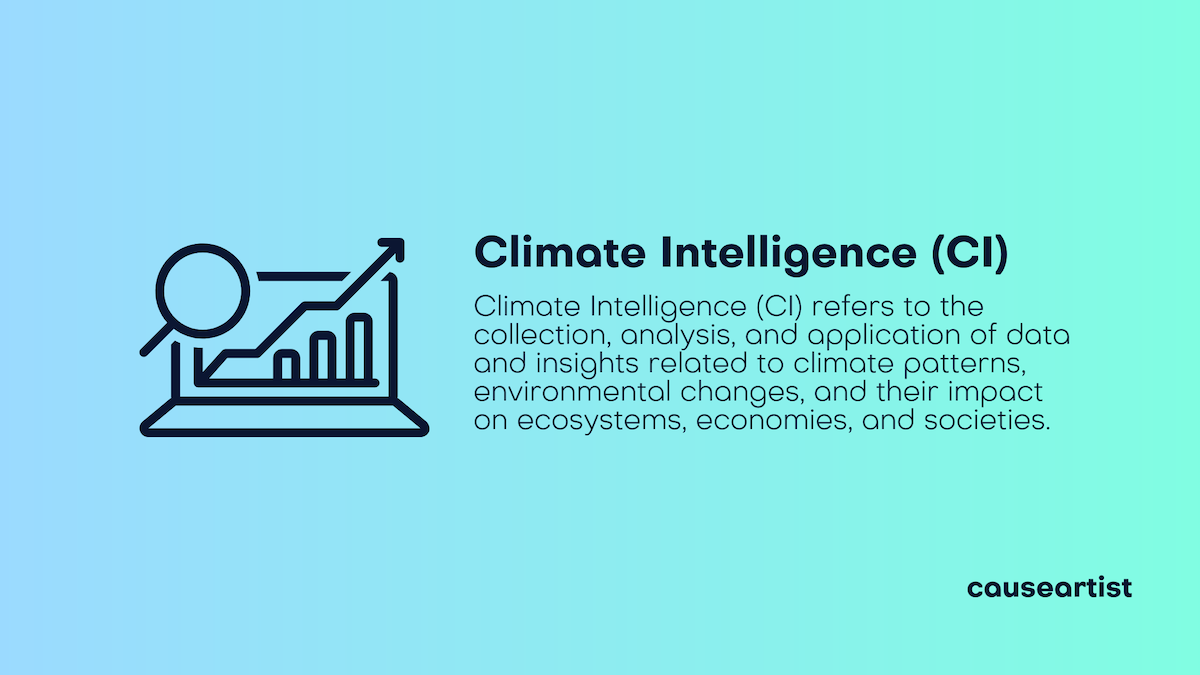Climate Intelligence (CI) refers to the collection, analysis, and application of data and insights related to climate patterns, environmental changes, and their impact on ecosystems, economies, and societies.
It integrates climate science with advanced technologies such as artificial intelligence (AI), machine learning, big data analytics, and Geographic Information Systems (GIS) to provide actionable information for decision-making.
By synthesizing historical data, current observations, and predictive models, Climate Intelligence helps stakeholders anticipate climate-related risks and opportunities.
It is a proactive approach, enabling organizations and governments to adapt, mitigate, and build resilience in the face of a changing climate.

Examples of Climate Intelligence in Action
Precision Agriculture
In agriculture, Climate Intelligence is revolutionizing how farmers manage their crops and resources. For example:
- Drones and IoT Sensors: Equipped with Climate Intelligence, these technologies monitor soil moisture, temperature, and crop health in real-time.
- Forecasting Tools: Climate-based models predict weather patterns, helping farmers optimize planting schedules and reduce water usage.
Example: The use of Climate Intelligence by companies like The Climate Corporation has helped farmers improve crop yields and reduce resource wastage.
Urban Planning and Infrastructure
Cities are leveraging Climate Intelligence to design infrastructure resilient to climate change.
- Flood Risk Analysis: Real-time data predicts flood-prone areas, enabling cities to plan drainage systems effectively.
- Heat Mitigation: Insights into urban heat islands guide the planting of trees and the use of reflective materials to reduce city temperatures.
Example: Singapore’s Urban Redevelopment Authority uses Climate Intelligence to integrate green spaces into urban designs to combat heat stress.
Energy Sector
The renewable energy industry depends heavily on Climate Intelligence to maximize efficiency and reliability.
- Wind and Solar Forecasting: Predictive models optimize the placement and operation of wind turbines and solar panels.
- Grid Management: Climate Intelligence aids in managing power grids by anticipating demand and ensuring supply continuity during extreme weather events.
Example: Companies like GE Renewable Energy use Climate Intelligence to enhance the performance of their wind farms.
Disaster Preparedness and Response
Governments and organizations use Climate Intelligence to prepare for and respond to natural disasters.
- Early Warning Systems: Predicting hurricanes, floods, and wildfires allows for timely evacuations and resource allocation.
- Resilience Planning: Insights guide the reinforcement of critical infrastructure in vulnerable areas.
Example: The Global Disaster Alert and Coordination System (GDACS) uses Climate Intelligence to provide real-time alerts for natural disasters worldwide.
Wildlife Conservation
Conservationists rely on Climate Intelligence to protect biodiversity and manage ecosystems.
- Habitat Mapping: Identifying and protecting critical habitats at risk due to climate change.
- Species Migration Analysis: Predicting how species will migrate in response to temperature shifts and other environmental changes.
Example: Organizations like WWF use Climate Intelligence to plan conservation efforts and mitigate the impact of climate change on endangered species.
Benefits of Climate Intelligence
Climate Intelligence offers transformative benefits for society and the environment, such as:
- Risk Mitigation: Predictive analytics help minimize economic losses and safeguard lives.
- Informed Decision-Making: Data-driven insights enable precise, proactive responses to climate challenges.
- Resource Optimization: Efficient use of water, energy, and materials reduces costs and environmental impact.
- Enhanced Resilience: Building adaptive capacity strengthens communities and businesses against climate disruptions.
Climate Intelligence can be a powerful tool that combines technology and data to address one of the most significant challenges of our time: climate change.
From agriculture and energy to urban planning and disaster management, its applications are vast and impactful.
As the world increasingly embraces Climate Intelligence, it holds the promise of creating a more sustainable, resilient, and informed future for all.







